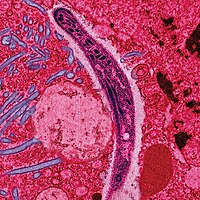
Photo from wikipedia
Ecologists seek to understand and predict how organisms respond to multiple interacting biotic and abiotic influences, an increasingly difficult task under anthropogenic change. Parasites are one of these biotic influences… Click to show full abstract
Ecologists seek to understand and predict how organisms respond to multiple interacting biotic and abiotic influences, an increasingly difficult task under anthropogenic change. Parasites are one of these biotic influences that are pervasive in natural systems and frequently interact with other stressors. Because they often have cryptic effects on their host organisms, their role in the distribution, abundance, composition, and dynamics of populations, communities, and ecosystems is easy to overlook. However, studies that neglect the role of parasitism may miss or misinterpret organismal responses to environmental change, hampering ecological predictions. We discuss case studies wherein the inclusion of parasite infection status altered the interpretation of ecological outcomes, and offer paths forward to make parasite data acquisition, analysis, and interpretation more accessible to ecologists. Given that parasites are responsive to environmental changes, timely attention to their influence on host responses is critical for accurately predicting future ecological states.
Journal Title: Ecosphere
Year Published: 2019
Link to full text (if available)
Share on Social Media: Sign Up to like & get
recommendations!